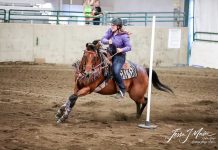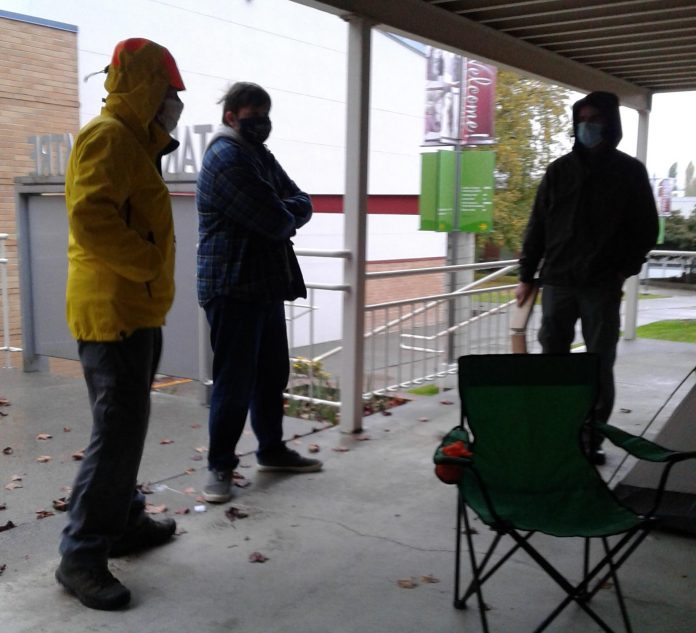
The Park Ranger approached from the North along the path at Skagit Valley College where he could access our campsite situated in front of the Phil Tarro Theater on an eerily quiet campus. The uniformed Cadet was entering a practice scenario and being assessed on how he reacted to our cooperation or lack there-of and other situational factors. These were only practice runs, but important steps in instilling the knowledge of procedure and legal guidelines, developing the cadets own personal style of interaction and building confidence with repetition. An instructor shadowed him responding to his radio communications and answering any questions he came up with.
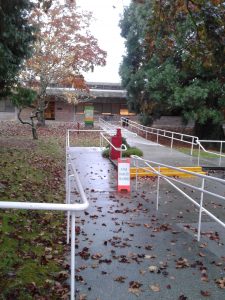
The Ranger entered as I, Richard Dingleberry and my hunting buddy Louie Lowcrotch (names we were given for identification purposes in the scenarios) were sitting innocently in lawn chairs, an empty chair between us and a very real tent to our right. In this instance Louie and I were both being friendly but not divulging any information. We both knew we were hunting on National Park land and lying outright about thinking we were in the National Forest. We both knew there were three of us, hence the chairs, and we both knew we were going to lie about everything but our names.
That Friday morning was cold enough to be a bit of an inconvenience making us all want to keep our hands in our pockets. My fingertips were in fact numb and my hands shaking uncontrollably the wind was so frigid. The issue of how criminally suspect having hands in pockets could be was a teaching moment that could not have been foreseen and factored into the scenario for each cadet differently as the morning progressed and our ability to keep our hands exposed to the wind was quickly diminished.
The pocket quandary Louie and I found ourselves in was quickly interrupted by two loud “shots” produced with a clapper from around the corner of the breezeway forest as the cadet now had to reorient himself to what could be real danger. That sound was quickly followed by my brother Michael Dingleberry running up briskly with a rifle, excitedly mumbling about how “I got that sucker.” He stuttered on the words and faltered a bit as he entered the site and realized he was facing an officer of the law understandably armed and now on the defensive. His adamant proclamation that he was merely firing at a target, and our outright refusal to acknowledge the suspect nature of our hunting intentionally on park boundaries leading the officer to navigate how to proceed. Does he take possession of our firearm? Does he issue any citations? How do his actions and decisions affect legal prosecution later? How does he look out for his own safety and keep control of a site with multiple people while alone?
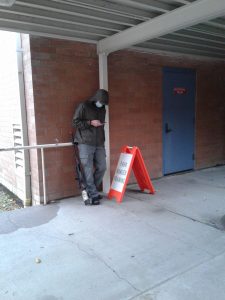
The Academy is attempting to finish testing for a group that started the program in the Spring that was forced to suspend their operations, and a current Fall group. This final graded testing is a very important step in finishing the program. It was established in 1990 and is one of only six accredited academies nationwide meeting Federal Law Enforcement Training Center standards for commissioning of Rangers for law enforcement roles in the National Park Service and other Federal Agencies. They are reaching the end of their approximately 17-week curriculum and practicing scenario-based field exercises that require role players for authenticity and to fulfill required testing parameters. The students often fill the vacancies that don’t get taken by volunteers, and the current reduced activity at the college is providing less volunteers at a time when they are badly needed because the students are also busy getting tased and pepper sprayed, still completing regular classroom courses.
Commander Rick Mossman (using his real name) was very appreciative of our timely request to volunteer. “It’s good for the cadets to see a different face every once in a while,” he says. As a former SVC student, I had often seen these scenarios being conducted. On mentioning I had always wanted to stop my foray to class and start filming the officer to simulate what seems like a realistic occurrence, I was told in no uncertain terms by Commander Rick thatI should have. The goal is mastering the skills and information critical to successful public service and protection of our natural resources.
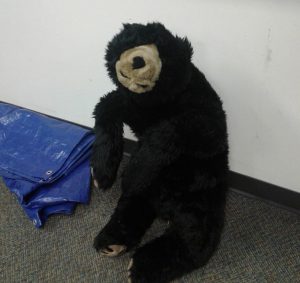
Short breaks between each Cadet provided almost enough time to regain feeling in extremities as Louie, Michael and I took turns being the running hunter, changing our personalities each time. We were summarily frisked when suspect, educated when appropriate, and even once told how dirty our campsite was. It may have been dirty, but not one Officer found that bear. I did mention we were poachers, didn’t I?
Volunteer and program inquiries can be directed to Jennifer Knezek, Law Enforcement Academies Office Program Coordinator at jennifer.knezek@skagit.edu.






